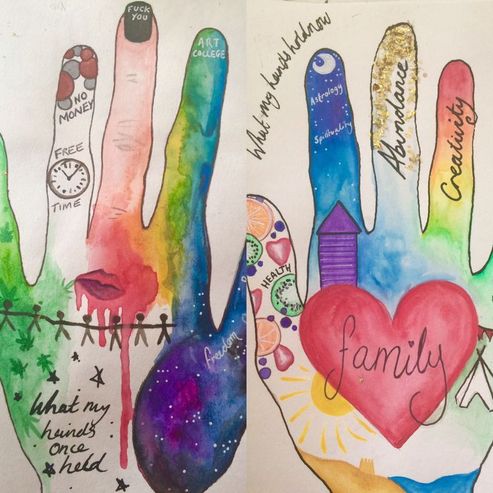|
Many parents want their teen to see a therapist. The reasons vary: sometimes parents see their teen is struggling and know they will not confide in them; other times, parents are struggling to manage the relationship with the teen, and think it will make life easier if the teen “works things out”, and then may become easier to manage and be around; and other times still, parents feel that there’s something wrong with their teen and want a professional and skilled person to assess the issues and help solve them.
The problem is that when one side, in any relationship, is pointing an accusing finger at the other side, stating - directly or indirectly - “you have a problem, so go fix it”, rarely does it elicit a collaborative reaction in the form of “of course!! You are right! It’s all my fault, so let me just go ahead and take care of it”. Let alone if the former is a parent and the latter is a teen - where power (i.e. hierarchy) is naturally skewed in the parent’s favor, and the teen - by virtue of the developmental task (see my previous post "The formula to having a happy teen is...") - is separating themselves from adults to venture on a journey of self-reliance, self-discovery and independence, making this charged relationship difficult to navigate around issues of accountability and collaboration. Therefore, the question that is begging to be asked is, can adolescents benefit from therapy? I have heard, numerous times, from members of the therapeutic community, that adolescents cannot be worked with in therapy - a statement that is as infuriating as it is careless and ignorant. There has been much research done on efficacy of therapy for mandated clients - that is, clients who are forced to take therapy. Most of it was conducted in prisons or other settings in which clients are usually mandated to therapy through the judicial system. The conclusion of all of them, is that mandated individuals can actually benefit greatly from therapy, as long as they can find a single, simple, personal motivator to participate. Imagine that! The only difference between effective and ineffective therapeutic processes is the client’s motivation to participate! Who could have predicted that? Sarcasm aside, this is the classic “you can lead a horse to water, but you can’t make it drink”. Teens, much like any other human being, can benefit greatly from therapy, if they have some motivation to get support, or are interested in gaining insight to what is going on with them. So should you force your teen to see a therapist? For the reason described above, my default answer would be NO, with a few exceptions (suicidality, self harm, harming others and/or other risky behaviors that demand intervention). So is it a lost battle? Am I supporting some of my colleagues’ perspective, that I had just criticized at the beginning of this post? How does one go about, when they truly believe their teen needs to see a therapist, yet their teen refuses? Well, I recommend leading by example…
What about when teens actually ask to see a therapist? There are many such teens who ask their parents to meet with a therapist, and make great use of of therapy, by gaining insight about what they need as they form their identities and sense of self. Paradoxically, it is not uncommon for parents to sabotage this process, by either asking to be involved in the process, or by pulling their teens out of therapy too early for various reasons (short funds, not seeing “results” and so on). To these parents I would like to stress out that building a therapeutic alliance takes time, and is a delicate process, that cannot and should not be rushed. The benefits of therapy, much like any other deep processes, show up slowly sometimes, and in various ways. Do not demand to be involved in the process, as confidentiality, and your teens’ trust in this confidentiality, are crucial for creating therapeutic efficacy. There are clear legal and ethical rules that therapists abide by, that make sure parents are informed on critical issues. You may also meet with your teen’s therapist, if you have questions or concerns, but it is important to respect confidentiality. Therefore, I encourage parents to find ways to soothe their anxiety (seek therapy, consult with other parents, read relevant blogs\books, meditate, exercise etc), and enjoy the fact they are now sharing the responsibility for their child with a professional adult. Adolescence is a tough and challenging stage for the teen and their family, and finding the right form of support can be crucial. Be mindful of your teen's need for respect and communication, and trust your own judgment in choosing the right avenue in offering this support to your teen.
2 Comments
OK, let’s cut to the chase: There is none. There is no formula or recipe that parents and caregivers can use to make sure their teen is happy, or easy to deal with, or successful or uncomplicated.
Let me be even blunter: If your teen is a well rounded ray of sunshine, all the time, everywhere, with everyone, I would be somewhat concerned. Reason being that adolescence's developmental task is to create a sense of self, which practically means they need to figure out who they truly are (this includes, but is not limited to their gender, sexual, cultural and political identities), and in order to do that they need to push away most trusted adults, question almost every value their lives have been organized around, and make mistakes that are often devastating. To top it all off, they need to do it all as they are managing achievements in school, with their own peers serving as their biggest support resources - which means they depend on people who are as confused and as lost as they are, most of the time. Can you imagine doing all of that without feeling angry, frustrated, lost, sad, nervous, emotional and overall out of whack? Understandably, parents want their children to feel good about themselves. They want them to be happy and safe and they really, really don’t want them to suffer. There are a few things harder than watching a loved one suffer, especially if one is in charge of their well being. But here’s the thing - this suffering (much like any suffering human beings endure) will be the greatest teacher to them. It is through this suffering that they will accomplish the above mentioned developmental task: They will learn exactly who they are, and who they are not. As much as I understand the need for some clear cut guidelines on how to deal with important issues such as social media, substance use, sexual behaviors (sexual intercourse, porn, etc), I refuse to suggest generic formulas to parents, on my blog or in my presentations, simply because formulas are a set-up for inadequacy. Formulas suggest that there is A RIGHT WAY of doing something. So if you tried following a formula, and it didn’t work, something must be wrong with you, or with your child (or both). In reality, however, every parent-child relationship, and every family dynamic, is as unique and as intricate as snowflakes (excuse the poetic imagery), and finding the right balance between the different, complex components, that make this dynamic effective, varies accordingly. It’s confusing and challenging enough to raise an adolescent - why add unnecessary doubts and fear of incompetency? The only generic guideline I offer parents of adolescents is: Keep engaging and communicating with your teens. It’s not about the ’what’, it’s about the ‘how’. More often than not, parents seem disappointed or cynical when they hear it and I understand why: it sounds like some new-age, flower-girl, naive statement and it leaves parents feeling lost with how to actually manage the day to day battle at home. Believe me, folks, I am very opinionated, and I am not shy to suggest clear and direct “action items” to parents and families who come into my office. I do not sit there and tell a family whose teen is struggling, to just smile and talk softly to their child. Nevertheless, whatever guidelines I’d recommend parents to take, I will always emphasize the need to communicate these actions in as a compassionate and respectful way possible, no matter how resistant the teen may be. Think about it: at the end of the day, as adults looking back at defining periods in our lives, we might not remember the day-to-day occurrences, but we definitely remember how we were treated. In adolescence - a time in which the young person is grappling with issues of identity, and their place in the world - what is of greatest importance is the sense of having a voice, and being seen and heard. In my next post I will go deeper into what it means and what actual skills are required in order to communicate and engage with teens effectively, so stay tuned, and\or feel free to contact me with any questions, thoughts or inquiries. One of the things I notice in my practice is how lonely parents feel in their parenting experiences with their teens. Somehow, even though most parents know adolescence is tough for many, there is still a sense of shame and inadequacy when it comes to sharing the challenges they are facing with their own teens. Maybe it stems from the values our society is organized around in general, and the parenting experience in particular: individualism and privacy, highly competitive and child-centered. We admire strength and success, condemn failure and often mistake vulnerability for weakness. These values combined create an atmosphere in which parents are competing, and their children are the product of their success. Parents have to create an individualized rearing path tailored to the individual needs of their children. If their children struggle and fail to succeed - by our society’s standards - the parents somehow failed and are therefore feeling inadequate. Not surprisingly, this isolation adds a significant amount of stress to parents’ experience, as they are not only having to deal with one of the toughest developmental stages their children will ever go through, they are also doing so in isolation, wasting valuable energy on ensuring, to the best of their ability, others don’t know of any difficulties or struggles. The reality is that there is no manual. Everyone is fumbling in the dark (accompanied by a confused parent, at best), feeling their way along the walls, running into objects, recognizing them only after they stubbed their toes, or noses into them. While it’s true that each family, each parent and each child have their own needs and their own special balancing act to invent and perfect, the mutuality lies in the mere fact we are all striving to meet those needs and to find and fine-tune this balancing act. In the multi-family group I facilitated, parents would report feeling an unimaginable sense of relief and surprise at how much they had in common with other parents, regardless of variables such as, race, culture, socioeconomics etc, and regardless of significant differences in the issues their teens were facing. It’s so much nicer when we don’t have to face it alone. As the old saying goes "It takes a village to raise a child", so where is our village? How does it look like? And what can we do to sustain it? The experience of the the village isn’t comprised of adults creating an informants’ network of eyes and ears to surveil their young people. The experience of the village is comprised, in its essence, by having adults, other than their own parents, young people can look up to, relate to, and reach out to. The difference between these two positions is cardinal. In the former, we are supporting an isolated, competitive experience of parenting teens, while in the latter - we understand this is a joint effort, and that we are all weaved into, and make up, the unique human fabric that is the environment in which we raise all of our children in. This is particularly true in adolescence, in contrast to early childhood, because adolescents - by definition and as part of their healthy developmental task - are moving away from their parents, and towards their peers, in an effort to figure out their identity. They are less likely to consult with, or listen to their parents - who they are now trying to differentiate themselves from the most. Parents, your teens are not living in a bubble - they are influencing and are being influenced by others: peers, social trends and idols and a few adults as well. While your teen may ignore, reject or resist your help and support, they may be more tolerant and open to hear from another adult. Coaches, teachers, relatives, spiritual leaders, neighbors, doctors, therapists, librarians, shopkeepers and other “aunts” and “uncles”, make the “marinade” that shapes your teen. If they can contribute to your child’s support - let them. And on the flip side of that - you may do the same for another’s teen. That’s what makes our village! Moreover, dear parents, we are all part of our village, so please remember you are not alone! Talk to your peers: reach out to other parents, who may or may not know your teen. Seek support for yourself: include people, professional and others, in your struggles and challenges, in your dilemmas and conflicts. More than any other variable - the existence of a strong community has been proven critical in human beings’ (of all ages), overall experience of happiness and fulfillment. By stepping away from shame and isolation, into community - allowing others to help guide your youth and stepping up to guide others’, as you seek support for yourself with those who have the tools to help, or with those who share our challenges - that is how we create and maintain our village.
Adolescence is, by far, one of the most difficult and challenging developmental stages for both parents and teens.
This post is dedicated to all of the parents who feel incompetent and inadequate: parents that are doing everything they know and everything they can for their struggling or distant teen, and are still left feeling helpless and frustrated. When it comes to their relationship with their teens, I often see parents take one of two stances, in an attempt to manage and keep up with the changing needs of both parties: They either become very involved, make demands and rules, supervise closely and micro manage their teen. Or, they loosen the rules, allow the teen to have a great amount of freedom in many areas of their lives, retracting their involvement and believe that by doing so they are conveying the message “I trust you”. Parents that choose the former stance often feel tired and frustrated by their inability to fully control all aspects of their teen’s life. They describe hating the experience of “policing” their teen and seek therapy because of the high levels of friction they have with them. Parents who take the latter stance, often seek therapy because they are disconnected from their teen. They feel powerlessness and concern because they have no access to their teen, despite a clear knowing - either factual, or intuitive - that they are struggling tremendously. I am not going to attack, dispute or go against either one of these stances because there’s nothing fundamentally wrong with neither one of them, as they are both valid, sometimes much necessary, approaches in child (and teen) rearing. There is, however, a fundamental component that must be incorporated into any such approach, without which neither one will be effective: engagement and communication. In order to be very clear, I will be slightly provocative: when dealing with teens ANY communication and engagement is welcome. It is many parents’ dream to have their teen come to them when they are in distress, to confide in them on any subject whatsoever, and to have harmony in their day to day lives. Reality is oftentimes quite different. In the rude awakening to the gap between the dream and reality, parents may become preoccupied by what is missing and lose sight of what exists. Often parents feel infuriated by the constant arguing and use of disrespectful language and tone, and exhausted by their teen’s ability to make every little thing into a huge discussion. Or, on the flip side of that behavior, parents are frustrated with the lean, dismissive and apathetic reactions to parents’ conversation initiatives and/or the insignificant topics their teens are approaching them with. It is important to understand that both of these ways of interacting are meaningful, because no matter what the interaction is seemingly about, and no matter how lean, or explosive it is - simply having those interactions is the teen’s way of saying: “I know you are here and I still need you”. It is their way to stay connected. If this perspective can be kept in mind, it may allow parents to feel differently about their contact with their teen; it may allow them to feel less judgmental of themselves and of their teen, and, possibly, it may allow them to react differently to their teen and alleviate the tension in the relationship. Nonetheless, holding a new perspective on any relationship isn’t always easy, especially on one which changes rapidly with a loved one whose well-being is entrusted in the parents' hands. Getting the right support can help significantly. Family therapy, or individual therapy are a good resource for that.
In my last post I briefly discussed what therapy is, who it is for, and how it works. This post is devoted to the therapist’s love - a complex and magical component, that takes therapy from being “just” an effective tool to a transformative experience.
I have had wonderful therapists, to which I will always be grateful, for supporting me in my unfolding growth process. But it wasn’t until I felt an amazing, special love, in the relationship with my (third) therapist, that I experienced the transformative healing power of the therapeutic love. The therapeutic love, which may also be referred to as “unattached love” or “unconditional positive regard” - is very different than most types of love we experience throughout our lives - it most certainly isn’t romantic love, neither is it a parent-child love, or even the love we feel for a dear close friend, but rather, it is the highest form of love human beings can offer one another. My clients see and feel loved through the look in my eyes, my behavior, and lastly, through my words. Being loved translates to a sense of safety, comfort and ease they experience physically, emotionally and mentally. They have a clear knowing I truly want to see them for who they are, I have no judgment about their thoughts, feelings, circumstances or behaviors, and I have no expectations from them, to do or be or feel or think any certain way. The therapeutic love resonates through the relationship: as it impacts both therapist and client, it reaches far beyond the therapy room, into the core of one’s self, and from there to other relationships. Moreover, it carries on for much longer than the working relationship does. This relationship resembles a heavy, fertile soil in a small pot inside a greenhouse, in that it creates the ideal conditions for something precious to grow. From here my clients can explore, learn, grow, change, accept and thrive. So what is it that allows me, as a therapist, to love my clients in such a deep way, and do I feel that automatically, towards all of them? Let me start at the end: The answer is yes, I do feel that way automatically, towards all of my clients, and as the relationship builds and deepens, the feeling of love also deepens and develops more and more intricate layers. What allows me to feel this love and approach my clients with it, are my empathy and compassion. In other words: When my clients sit with me, I recognize the suffering they feel in myself and in humanity as a whole; I recognize how difficult it is to experience this suffering, let alone share it with another person - a stranger at first; I see the human spirit as beautiful and complex - it cannot and does not comply with simplistic ideas and moralistic notions - no matter how much we want it to; I believe we all do the best that we can at any given moment, considering who we are and the circumstances we are facing; I do not believe we are self-destructive, but rather that we have strong survival needs that might pull us in opposite directions, lest we become aware of them and fully understand them; I understand hurting others is a painful yet often unavoidable consequence of the search for authenticity; I have no agenda about how anybody’s life should be lived and believe my only role, is to support my clients in exploring who they truly are - this exploration cannot be limited by what most of us have been conditioned to think and feel throughout our lives. Experiencing such compassion and empathy translates into feeling, and consequently offering, therapeutic love: unattached, unconditional positive regard. To those of you who wonder whether this approach works for teens, especially those who have behavioral issues, the answer is yes!!! Teens, sometimes more so than adults, need a space to explore their feelings and needs freely, in the presence of a responsible loving, nonjudgmental adult. To sum it up, I wanted to devote this post to the exploration of the unique experience of the therapeutic love since I feel it’s not addressed or spoken of too often - possibly because, much like any other type of love, it is so hard to define and complex to describe. Guided by my own experiences as a client, I aspire to experience this magical love with my clients. I urge one and all to look for this beautiful quality in therapy - it can be found.
So... what is therapy? Who needs it? How does it work?
Let me put it simply: Everybody can benefit from therapy. Often when I say that, people take offence by it, as if I am saying something is wrong with them, and making an assumption about their mental health. To understand my statement I need to explain what therapy is: Therapy is a general name for a practice, designed to help us take care of our emotional, mental and even spiritual well being. So if I was to say: “everybody can enjoy a spa day”, there would be more of an agreement about that, right? Maybe a few people would say: "Spas aren’t for everybody. I really hate massages and I can’t relax in a hot tub!" Well then, what if you could just get a foot massage? Or a manicure? Or just sit by the pool and relax in the sun? Would that be something you’d be interested in? Therapy is similar in that it is a general name for a huge variety of services, all of which focus on the emotional\mental well being of us, human beings. So, keeping that in mind, let’s go back to my bold statement and refine it: everybody can benefit from different types of therapy, at one point or another of their lives. I truly believe the world would be a better place if therapy (i.e. mental health services) would be accessible to everyone. I also wish getting emotional support wouldn’t have the negative stigma it unfortunately still has for many people. If you tend to think seeking therapy will reflect badly on you, try thinking about it this way: if you have a physical issue, you take care of it by going to the doctor. There is no reason our approach should be different when it comes to our mental health. People usually seek therapy when they need help managing their lives and\or emotions. They might feel an array of emotions, such as sadness, confusion, anxiety or anger (just to name a few) and their overall sense is that something is wrong with them or with their lives. The rise in emotions is often prompted by all sorts of life situations and circumstances (relationships, transitions, grief, life stages etc.), or it can be a low point in an ongoing process of decline. Often people need help managing those emotions and making sense of them, and they really just want them to stop. And more often than not, they want to make better choices, or change things in their lives, by working through those emotions and life situations. And now to the “mother of all questions”: how does therapy work? Well, let’s go back to that wonderful spa day I was talking about. Different services help different areas in different ways: getting a manicure might help you feel better by making your hands look good, while getting a deep tissue massage relaxes your muscles and releases tension. Similarly, different therapies help different areas in our lives, in different ways: Cognitive Behavioral Therapy (CBT) teaches ways to change behaviors through changing the way you think of things and is very effective for treating anxiety and depression; Depth Psychology offers ways to look deeper into your history and see how they affect your present, so it’s very effective for people who are experiencing deep and existential crisis; and Eye Movement Desensitization and Reprocessing (EMDR) is extremely helpful in treating post traumatic stress disorder (PTSD). Despite of this somewhat crude and generalized description, if you are dealing with any of the above mentioned symptoms, you might consider looking for therapists with these specialties. It is important to understand that no matter what specialty you are looking for, the most significant factor in therapy is the relationship with your therapist. I will explore this element deeper on my next post, but for now, I just want to emphasize how imperative it is to find a therapist that fits not only by their qualifications, but by their personality and by the chemistry you have with each other. There are too many people out there who believe therapy “doesn’t work” because the relationship they had with their therapists wasn’t strong enough to make an effect. If you are seeking therapy, don’t hesitate to contact and\or meet with more than one therapist, before you make your choice. There are several search engines that are effective resources you can browse through in order to get an idea about therapists in your area. Yelp - https://www.yelp.com/ Psychology Today - www.psychologytoday.com And Google - www.google.com , just to name a few. Many therapists, myself included, offer 15 to 20 minutes consultation calls, free of charge, which is a great way to “feel out” the therapists who you might consider seeing, based on their websites, or other referral sources. To sum it up, therapy is the practice of creating change in our lives through healing our hearts and minds; anyone can benefit from it, and it works by two major components: the chemistry with our therapist and the specific expertise they have that matches our needs. If you are struggling emotionally right now and you are seeking support, you might consider the simple points I made to start figuring out how to precede. I see you, my young friend, I really do.
Much like Marvel’s Bruce Banner, you are split in two. One part of you, “The Hulk”, wants to walk away from the life you’ve known so far, and from the life your parents dreamed for you. You secretly like to daydream about living the life of a full blown gangsta, hanging with your homies, making tons of money, doing drugs and fending for yourself on the streets. You’re smoking, drinking, huffing, snorting, swallowing. You love the adrenaline rushes that you get from breaking in, breaking out, being chased by and chasing after. You enjoy fooling the police\parents\girls\suckers, and getting away with it. You’re a hustler doing his thing - you’re making fast money in all kinds of creative ways. It all feels real, powerful, badass. Most people just don’t get it: the danger, the intensity, the friendships. Living on the edge is addictive. Other kids, “good kids”, are boring… Honestly, anybody that does not do what you do is boring. ‘Fuck school’ you tell yourself ‘School is for nerds, and it has nothing to do with my life’. Parents, teachers, and adults in general, are so clueless, they have no idea. Your life is crazy (and you enjoy this notion), yet somehow, every single crazy thing you did made perfect sense in the moment. Everybody else was on board, and besides, it’s not as bad as adults make it seem. They don’t understand everybody does it. At least the people you hang around with, which are the people you care about the most. Nobody talks about it without rolling their eyes and judging, but you know: there’s more than one way to live. Snoop Dogg and Kokain are Crips, YG and The Game are Bloods… They are living examples of how good living life the “bad way” can be, and the “good way” isn’t very appealing to The Hulk. The other part, “Bruce Banner”, wants his life back. He wants a very different future, one that does not involve jail. There are moments that the thought passes through your head, as fast as lightning: you want out. You’re tired and scared. The real is too real. And there’s no way out. You owe people money, and this is no “kids play”, it’s real. And dangerous. You can’t keep it up. You’re in too deep, and so are all of your friends… “friends” - you know they will stab you in the back, figuratively and possibly literally, if you mess up, if you flinch, if you snitch. There’s only one way to be around them, one way to talk, one way to feel. So many “don’ts”: don’t act stupid, don’t look scared, don’t show any emotion. It’s not who you are. Or at least it’s not who you were not that long ago, and you’re not really sure who you are anymore. Sometimes, with some friends, especially those who you’ve known for a long time, you remember other ways you can be: you relax, laugh, even talk differently. With every passing day you lose face in school and you fall behind farther. You don’t want to be one of those “dumb kids”, but in reality the gap is getting bigger and you feel like you already are. You know doing well in school is the key to the only life you always wanted, and it’s also your way out. Falling behind is like signing up for a membership card for another life: drugs, jail, violence, fear, more drugs. Bruce wants it all to stop. They rarely talk to each other, and I wonder which one of them knows more about the other, but I do know you don’t know how they switch from one to the other and you don’t know how to control either one of them. Much like your parents, you are often surprised by your own behaviors and capabilities. Much like them, you don’t recognize yourself sometimes, and there are moments in which you like it, and others in which it scares you. My young friend, please stop for a second and listen to me. I’ve seen this so many times. No one person is ever like another, but there are similarities in patterns - you are not the first to go through this. What you are going through is, more than anything else, a fight for autonomy and power. The need for those is primal, and is felt by all humans. It is the driving force of most of your thoughts, feelings, and actions, even though you may not be fully aware of it yourself. You hate being under adults’ control, abiding their rules, living up to their expectations. You are capable and strong, and taking your power back feels so good. Here’s where it gets tricky though: Often, what feels like claiming your power in the present, is a certain march towards losing your power in the most dramatic way in the very near future. Often, paradoxically, giving up your power momentarily, will guarantee the gain of power in the near future. Bruce knows this but is sometimes struggling to convince The Hulk. Immediate gratification is such a strong motivator. As much as it may seem irrelevant to you right now, please know that losing your freedom, as a result of repeatedly breaking the law, is NOT an experience I’d recommend having, no matter how cool and common it may seem. Some things are going to be hard to shake and almost impossible to change: The lost time cannot be gained back, the bad reputation and society’s double standards towards people who committed crimes can become a burden that you will carry with you forever. Another thing that cannot be changed, and will impact you in many ways, is the effects drugs (and other substances) have on your still developing brain. These are facts, I am not trying to scare you. Drugs lose their beauty and magic with time. When you find yourself needing them to help you avoid feeling and thinking about things that make you feel bad, you’re going to start hating them. If you don’t learn how to deal with those "bad feelings" (such as guilt, regret and shame) you will be caught in a vicious cycle: feeling them for needing drugs, needing drugs to not feel them. If I have convinced you that Bruce needs some backup, I strongly recommend seeking help. Here are a few options: 1. As counterintuitive as it may sound - find a trustworthy adult: a parent, teacher, neighbor, relative or counselor, and talk to them. Ask them to hold their judgment and then tell them what you need: sometimes you’ll need them to just listen. Sometimes you’ll need advice. They might surprise you for the better. 2. If you can’t find a trusted adult, try calling a youth emergency line. They are good listeners and are easy to talk to. Here’s the number for the California Youth Crisis Line: 1-800-843-5200. It’s a toll free number and can be dialed from every state. 3. If you are unable or unwilling to reach out, but you want to find a way to help Bruce yourself, try writing your thoughts down. You can write a conversation between your Bruce and The Mighty Hulk - it’ll be good for them to talk. Choosing how and where to go from here is your choice, and it's yours alone, my young friend. No one will be able to stop The Mighty Hulk from digging you deeper and deeper into this lifestyle, and no one will be able to take credit for Bruce's ability to change this course if you claim a different life for yourself, and that is, by far, the ultimate power anyone can have. "What are you saying? You think you can control it?" "No no no, not con-not control it, but, I don't know, maybe aim it." ―Betty Ross and Bruce Banner, from "The Incredible Hulk" New beginnings (is there any other kind, really?)... I know you hate them. So many people do. No matter what it is that we are starting: a new job, a new school, a new activity - we are at a discomfort, even if it is something we really want to do.
Why do we hate them so much? Well, probably because we are moving from the familiar to the unknown, and us, human beings, are creatures of habit. New beginnings are scary, and nerve wracking, to the point we will sometimes stay in a job\relationship\environment we dislike, and give up on opportunities to feel and do better, just to avoid this discomfort. Unfortunately, there is no way to avoid new beginnings altogether, no matter how much we try. It is an integral part of our existence, naturally connected to the ebb and flow of life: whenever something ends, something else begins. Nevertheless, because it is inevitable, it gets better as we grow older. No, we don’t necessarily become “beginning enthusiasts” (although one might), but life experience is invaluable in the way it helps us prepare for any new beginning. It guides us in: making the choice (if it is in our hands), allocating our energy, setting the expectations for ourselves, allowing us to enjoy the unfamiliar new experience, and finally - in how we deal with the result. How so? We experience successes and failures and learn to manage both; we get to know what we love doing, what we can tolerate doing and what we hate doing with vengeance; we know what it is we’re really good at, what we can get better at, and what we really don’t have any skills for. For example, starting a blog is huge for me. Not something I would have ever guessed I’d do. Am I scared? Absolutely. Insecure? Undoubtedly. Nervous? Most certainly. But guess what? I am also excited, inspired, almost ecstatic - to do it. Why, you ask? Well… First, because I have some things to share that I hope will inspire, support and help others. Second, because I enjoy the writing process, and third, because I am thrilled to face the challenge whether I succeed or not. Primarily working with teens, I wonder would I dare do something like this as an adolescent? And the answer is very clear: No way!!! I took myself way too seriously back then. Every risk felt like it could destroy me, so I often avoided things that involved potential failure or embarrassment. I think us adults often forget how hard it really was to be a teenager. So other than to let life do what it does, how can we get better at dealing with new beginnings? One way lies in the famous saying “do one thing every day that scares you”. When we do that, we gain life experience quickly and effectively, and we won’t let fear control us. Another way is to simply accept and embrace the circumstances, without judgment. Tell ourselves something like “I’m starting this new task, I know I’m going to feel uncomfortable for a while and that’s ok. It won’t last forever”. It won’t make the uncomfortable go away, but it will eliminate the elements of surprise and self-bashing. A third, and very effective way, is to remember previous beginnings, how they felt, how we got through them, and what helped. I strongly recommend writing those down! And lastly, and this is important: Talk about it! Find at least one person who cares, and confide in them. Finding words to describe our experience dissipates the anxiety, and sharing it with others shows us we’re not alone. So here’s to new beginnings! Happy 2018! |
AuthorMaya is a marriage and family therapist, working primarily with teens, families and adults, in the east bay, California. Archives
October 2018
Categories |












 RSS Feed
RSS Feed